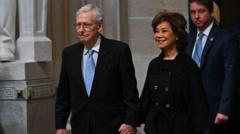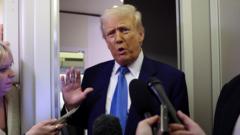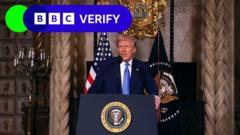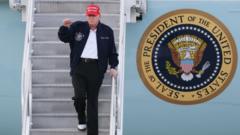The summit signifies Europe's urgency to unify on defense spending and troop commitments as uncertainties loom over US involvement in Ukraine.
**Europe and UK Pursue Influence in Ukraine Amid US-Russia Talks**
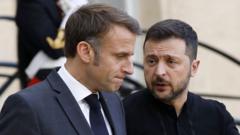
**Europe and UK Pursue Influence in Ukraine Amid US-Russia Talks**
As European leaders convene in Paris for crisis talks, they seek to assert their role in Ukraine's future following US-Russia negotiations.
In a critical display of European solidarity, leaders are gathering in Paris to discuss Ukraine's future amidst rising tensions with Russia. The urgency of the meeting reflects Europe's unease at being sidelined in US-Russia discussions over Ukraine, particularly following US President Donald Trump’s announcement of potential talks with Russian President Vladimir Putin. This summit serves as a crucial opportunity for Europe's leaders to reinforce their position and demonstrate relevance to Ukraine’s future.
UK Prime Minister Sir Keir Starmer has signaled readiness to support troop deployment to Ukraine, while Germany's CDU party conveys a willingness to commit military support within a broader international framework. However, uncertainty surrounds the Trump administration's strategic objectives regarding Ukraine, creating a small opening for Europe to advocate for a strengthened partnership. Central to these discussions are demands for increased European defense spending and troop contributions to Ukraine following a ceasefire, reflecting a broader desire for autonomy in the face of traditional reliance on US security support.
European leaders are presenting a unified stance: no negotiations regarding Ukraine should occur without its direct involvement. This principle has been a cornerstone of their diplomacy, emphasizing Ukraine's sovereignty in the decision-making process. However, anxieties persist about the potential shift in global power dynamics based on the outcomes of US-Russia talks.
The upcoming gathering will feature key military nations, including the UK, France, Germany, and Italy, while other European states will participate in follow-ups. Expectations for dramatic commitments during the summit are tempered by national economic pressures and the logistical feasibility of troop deployments. Despite Polish commitments to increase defense spending significantly, shared pledges for military support remain elusive as some nations grapple with domestic opposition to further military involvement.
One proposal under consideration is the deployment of a "reassurance force" in Ukraine post-ceasefire, aimed at bolstering national morale and maintaining a European presence as a counterbalance to Moscow's influence. However, public opinion in various nations, such as Italy, shows skepticism toward military engagement, complicating leaders' efforts to rally support for such initiatives.
The outcomes of the Paris summit could set the stage for future engagements with Washington, as leaders contemplate an official envoy to emphasize Europe’s commitment to self-defense. Starmer's forthcoming visit to Washington offers a pivotal opportunity to bridge the gap between European and American approaches to security.
French President Emmanuel Macron, advocating for European self-sufficiency in defense and security, hopes the summit will mark a definitive shift towards greater European agency in geopolitical affairs. The demand for collective and robust European action is more pressing than ever as the US's future trajectory concerning Ukraine remains unclear. European leaders face a dual challenge: to present a unified front while navigating their own political landscapes and the complexities of international relations.
As they chart their path forward, the question remains: will European leaders succeed in making a compelling case for their relevance in the Ukraine crisis, and will Trump be receptive to their overtures? With both Russia and the United States observing closely, the implications of this summit will resonate far beyond Paris.
UK Prime Minister Sir Keir Starmer has signaled readiness to support troop deployment to Ukraine, while Germany's CDU party conveys a willingness to commit military support within a broader international framework. However, uncertainty surrounds the Trump administration's strategic objectives regarding Ukraine, creating a small opening for Europe to advocate for a strengthened partnership. Central to these discussions are demands for increased European defense spending and troop contributions to Ukraine following a ceasefire, reflecting a broader desire for autonomy in the face of traditional reliance on US security support.
European leaders are presenting a unified stance: no negotiations regarding Ukraine should occur without its direct involvement. This principle has been a cornerstone of their diplomacy, emphasizing Ukraine's sovereignty in the decision-making process. However, anxieties persist about the potential shift in global power dynamics based on the outcomes of US-Russia talks.
The upcoming gathering will feature key military nations, including the UK, France, Germany, and Italy, while other European states will participate in follow-ups. Expectations for dramatic commitments during the summit are tempered by national economic pressures and the logistical feasibility of troop deployments. Despite Polish commitments to increase defense spending significantly, shared pledges for military support remain elusive as some nations grapple with domestic opposition to further military involvement.
One proposal under consideration is the deployment of a "reassurance force" in Ukraine post-ceasefire, aimed at bolstering national morale and maintaining a European presence as a counterbalance to Moscow's influence. However, public opinion in various nations, such as Italy, shows skepticism toward military engagement, complicating leaders' efforts to rally support for such initiatives.
The outcomes of the Paris summit could set the stage for future engagements with Washington, as leaders contemplate an official envoy to emphasize Europe’s commitment to self-defense. Starmer's forthcoming visit to Washington offers a pivotal opportunity to bridge the gap between European and American approaches to security.
French President Emmanuel Macron, advocating for European self-sufficiency in defense and security, hopes the summit will mark a definitive shift towards greater European agency in geopolitical affairs. The demand for collective and robust European action is more pressing than ever as the US's future trajectory concerning Ukraine remains unclear. European leaders face a dual challenge: to present a unified front while navigating their own political landscapes and the complexities of international relations.
As they chart their path forward, the question remains: will European leaders succeed in making a compelling case for their relevance in the Ukraine crisis, and will Trump be receptive to their overtures? With both Russia and the United States observing closely, the implications of this summit will resonate far beyond Paris.


